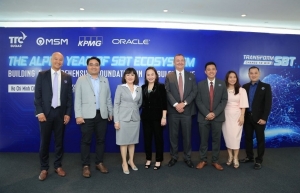INTERNATIONAL INVESTMENT
AND PORTAL
What is the level of interest among Singaporean corporations in the digital ecosystem and digital economy in Vietnam?
 George Choo, president of the Association of Telecommunications and Technology Industry in Singapore
George Choo, president of the Association of Telecommunications and Technology Industry in Singapore
Singapore is Vietnam’s largest foreign investor so far this year, with significant investments in various sectors, including digital and innovation. The level of interest among Singaporean corporations in Vietnam’s digital ecosystem is high and continues to grow, driven by strong economic ties and mutual benefits. This interest is reflected in several key areas such as digital payment, e-commerce, logistics, and others.
For instance, Grab, originally from Malaysia but heavily backed by Singaporean investors, has expanded its operations in Vietnam. It has become a major player in the ride-hailing and digital payment sectors, contributing significantly to Vietnam’s digital economy.
Similarly, owned by Singapore-based Sea Group, Shopee has leveraged Vietnam’s growing e-commerce market. Its use of big data and AI has optimised the shopping experience, making them a top e-commerce platform in Vietnam.
In the real estate sector, popular names are Keppel Land and CapitaLand. The former has been involved in various high-end residential and commercial projects in Vietnam. They have also ventured into smart city initiatives, integrating digital solutions to enhance urban living.
In the logistics sector, YCH Group is partnering with Vietnam’s T&T Group to develop a smart logistics connectivity infrastructure project in the northern province of Vinh Phuc. This project aims to enhance logistics efficiency through digital solutions. Recent agreements between Singapore and Vietnam help enhance collaboration in the digital economy. These agreements cover areas like cybersecurity, clean energy, sustainable development, and smart cities. The framework builds on earlier MoUs signed in 2022, focusing on digital economy, energy, carbon credits, and innovation.
Is Vietnam’s digital economy development policy attractive enough to increase its attraction to foreign-invested enterprises from Singapore and elsewhere?
Vietnam’s digital economy development policies are indeed attractive to foreign-invested enterprises, including those from Singapore. It has attractive mechanisms, such as the National Digital Transformation Programme, which was launched in 2020 and aims to transform Vietnam into a digital society by 2030.
The Vietnamese government offers various incentives, such as tax breaks and streamlined administrative procedures, to draw in foreign investment in the digital sector. In addition, it has signed multiple agreements with other countries, including Singapore, to enhance digital trade and cooperation.
However, companies still face challenges related to regulatory compliance and navigating the local business environment. Worse still, despite improvements, there are still gaps in digital infrastructure that can pose challenges for foreign companies.
Singapore is one of the countries having successful approach in developing the digital ecosystem. What are the lessons for Vietnam?
Singapore has made significant strides in developing its digital ecosystem since the turn of the century. Its digital ecosystem development is backed by early initiatives such as civil service computerisation programme in the 1980s, which laid the foundation for e-government by digitising public services; and the IT 2000 Strategic Plan in the following decade, which aimed to transform Singapore into an “intelligent island” by enhancing IT infrastructure.
Another is the Smart Nation Initiative, established in 2014. Specifically, to develop digital government, Singapore focused on creating a seamless, efficient, and responsive government through digital services. For digital economy, it encouraged businesses to adopt digital technologies to drive growth and competitiveness. And for digital society development, it empowered citizens with digital skills and tools to improve their quality of life.
Singapore also has key strategies. They include public-private partnerships to drive innovation and implementation; initiatives like Research, Innovation, and Enterprise and AI Singapore to test and scale new technologies; and digital connectivity by ensuring world-class digital infrastructure to support the ecosystem.
Vietnam can learn some lessons from our country in its development of digital ecosystem and digital economy. Firstly, Vietnam should have a holistic approach by having an integrated strategy. It can adopt a comprehensive digital transformation strategy that includes government, economy, and society, similar to Singapore’s Smart Nation framework. It should also encourage partnerships between the government, private sector, and academia to foster innovation and implementation.
The Southeast Asian nation should also focus on digital connectivity, living laboratories, and empowerment and skills development. Investing in robust digital infrastructure can support the growing demands of a digital economy. Meanwhile, living laboratories create environments where new technologies can be tested and scaled, similar to Singapore’s approach.
Moreover, implementing programmes to upskill the workforce can ensure they thrive in a digital economy. Empowering citizens with digital tools and services can also improve their quality of life and participation in the digital economy.
By learning from Singapore, Vietnam can accelerate its digital transformation and build a robust digital ecosystem that supports sustainable growth and development.
 Digital ecosystems the new game-changer in Southeast Asia
Digital ecosystems the new game-changer in Southeast Asia
The new EY study Building Successful Digital Ecosystems in Southeast Asia highlights that the digital transformation is imperative for businesses and that participating in digital ecosystems is a game-changer that can create long-term values and competitive advantages.
 Manulife Vietnam bolsters digital ecosystem with simplified policy kit
Manulife Vietnam bolsters digital ecosystem with simplified policy kit
Manulife Vietnam continues its digital transformation with the recent launch of a new, simplified policy kit, delivering a hybrid solution that reflects the current needs of customers and the insurer’s commitment to a more sustainable future.
 Transform SBT building comprehensive foundation for the digital ecosystem
Transform SBT building comprehensive foundation for the digital ecosystem
On August 15, Thanh Thanh Cong-Bien Hoa JSC, in collaboration with MyMind JSC (MsM) and KPMG Vietnam Co., co-organised the event The alpha year of SBT ecosystem – Building a comprehensive foundation in a turbulent time at the Sheraton Saigon Hotel.



















